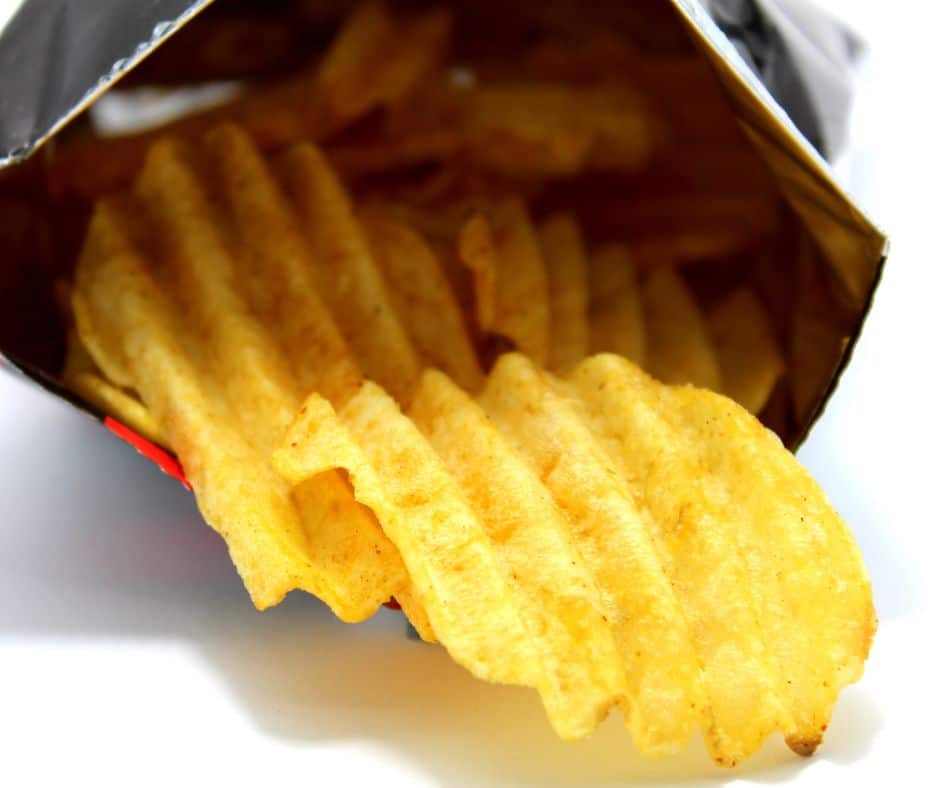If you’re a runner then you’re probably familiar with leg cramping and all the tips and tricks other runners have recommended to cure your cramps.
One of the popular theories is that potato chips can prevent leg cramps while you’re running.
Is this true though?
Potato chips can prevent leg cramps because they contain potassium and sodium – two important electrolytes that help your muscles to contract, relax and function smoothly.
However, these nutrients can be found in many different foods, so eating a balanced diet, in general, will prevent muscle cramps.

Will Potato Chips Stop Muscle Cramps Caused By a Nutrient Deficiency?
Muscle cramps can be caused by a number of things, but one of the main causes is nutrient deficiency and this is where the potato chips come in.
If you’re lacking in certain nutrients, eating foods that are rich in those nutrients will help to relieve the cramp and prevent cramps from occurring in the first place. Bananas and potato chips are some of the most commonly recommended cramp cures.
During long runs or training sessions, it is important to replenish the nutrients your body is using as fuel. Therefore eating certain types of food and drinking sports drinks with electrolytes will help prevent your muscles from cramping.
Making sure you eat a balanced diet with all the food groups is important for your health and helps to ensure that you have the proper fuel for running.
Potato chips contain potassium and sodium (salt) which are both important electrolytes that help muscles to function properly. Potassium aids in electrical impulse generation, so if you’re not getting enough of it, your muscles are more susceptible to cramping. Sodium affects blood pressure and also helps muscles to contract.
What You Should Eat If You Get Leg Cramps
If you suffer from leg cramps, it’s difficult to say which food group you should be eating more of or what supplements you should take if your diet does not allow for all food groups because it’s different for everyone.
You need to analyze your diet and see which food group you may be neglecting. It’s all about trial and error so find what works for you and stick to it.
A well-balanced diet includes dairy, protein, fruits, vegetables, whole grains, nuts and seeds. All of these food groups are important for your health and help to fuel your body and your muscles during physical exercise.
Drinking plenty of water and staying hydrated is also vital as dehydration results in muscle fatigue which causes leg cramps and other problems.
Why Potato Chips Prevent Leg Cramps
1. Sodium
Foods such as celery, beetroot, pickled food, olives, carrots, and cheese contain Sodium. Sodium contributes to blood pressure and regulates the body/fluid balance. It also plays a role in muscle contraction.
Another great source of sodium is natural salt. That is why potato chips flavored with natural sea salt are a firm favourite among runners to help prevent leg cramps.
2. Potassium
Potassium can be found in fruits and vegetables, especially bananas, sweet potatoes, avocados, citrus, potatoes and pumpkins. It can also be found in fish and dairy products.
Potassium is one of the main electrolytes found in the cells of the body and is one of the reasons that people suggest eating potato chips because potatoes are rich in potassium. This nutrient is essential for proper nervous system function as well as muscle function. Potassium also aids in electrical nerve impulse generation, which is the reason that your muscles will cramp if you’re not getting enough of it.
3. Magnesium
Foods like legumes, avocado, bananas, dark leafy greens, nuts and seeds, and natural yoghurt contain magnesium which is important to prevent leg cramps when running.
Magnesium gets stored in our muscles and it is used in the contraction and relaxation of the muscles and also helps to balance out electrolytes, protein synthesis and the production of energy.
4. Calcium
Dairy products like milk and cheese as well as nuts and seeds contain calcium which also aids in the prevention of leg cramps while running.
Calcium plays a crucial role in the body including strengthening our bones. It also helps our blood clot and helps your muscles to function smoothly.



Comments are closed.